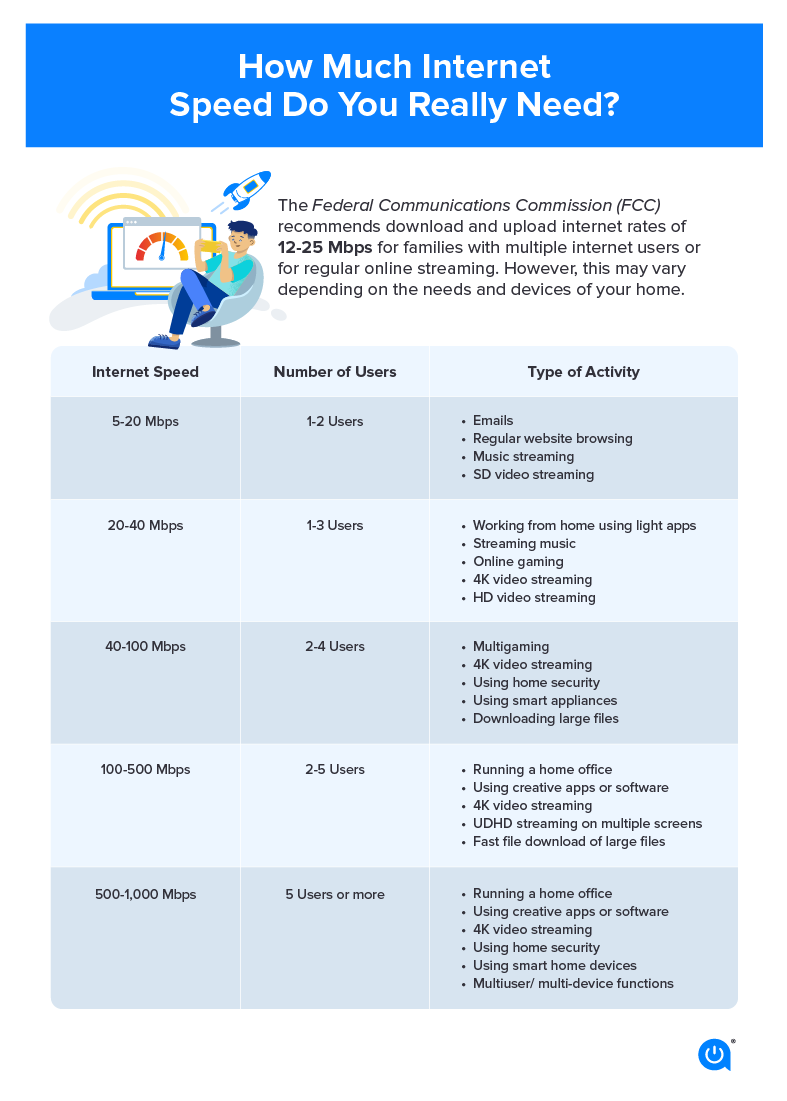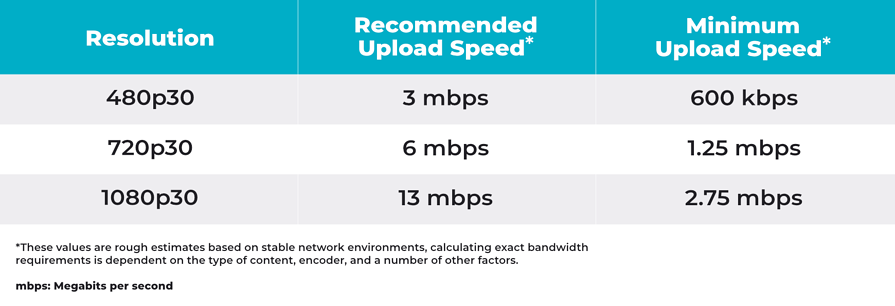The Impact of Megabits Per Second on Streaming Quality and Performance
The Impact of Megabits Per Second on Streaming Quality and Performance
Blog Article
Exactly How Megabits Per Second Impact Your Online Activities
The concept of megabits per second (Mbps) plays a pivotal function in shaping our on the internet experiences. As digital activities proliferate, comprehending the ramifications of Mbps on video clip, pc gaming, and streaming conferencing comes to be significantly vital. Greater Mbps can enhance performance and reduce disruptions, while poor rates might promote disappointment and ineffectiveness. Examining your home's particular needs in regard to these rates is necessary, specifically as several gadgets vie for bandwidth. The subtleties of exactly how Mbps affects numerous online tasks warrant additional expedition, especially as our reliance on electronic connectivity proceeds to evolve.
Recognizing Megabits Per Second
When taking into consideration internet rate, it's important to recognize the idea of megabits per second (Mbps), which functions as a standard dimension for information transfer rates. This statistics evaluates just how much information can be transmitted over a web link in one second, supplying a clear understanding of efficiency capabilities - Megabits Per Second. For context, one megabit is equivalent to one million little bits, and Mbps is typically made use of to express data transfer for various on the internet activities
A higher Mbps suggests a much faster internet link, allowing users to do jobs such as downloading data, searching websites, and engaging in on-line gaming a lot more successfully. As an example, normal surfing calls for around 1-5 Mbps, while streaming high-def video may demand 5-25 Mbps. Comprehending these needs is crucial for identifying the proper net speed required for details tasks.
Additionally, the number of devices connected to a network can impact total performance. Multiple users streaming, gaming, or downloading at the same time can strain available bandwidth, leading to slower speeds - Megabits Per Second. Assessing personal online practices and requirements is vital in selecting a web plan that aligns with one's demands, ensuring a smooth electronic experience
Streaming and Buffering Issues
Streaming high-definition material has ended up being a staple of contemporary on-line amusement, yet it is often accompanied by annoying buffering issues. These interruptions can significantly interfere with the watching experience, causing discontentment and prospective loss of audience engagement. Buffering takes place when the data transmitted from the streaming solution is not gotten promptly enough to preserve a smooth playback, often because of inadequate net rate gauged in megabits per second (Mbps)

In addition, real-time streaming can be influenced by network blockage, which happens when multiple devices share the very same data transfer. Consequently, optimizing link rate and making sure sufficient Mbps is important for a smooth streaming experience. As streaming services proceed to progress, recognizing the effect of Mbps on buffering issues continues to be important for consumers looking for undisturbed home entertainment.
Online Video Gaming Performance
The influence of internet rate on online tasks extends past streaming, considerably influencing on the internet gaming efficiency. In competitive video gaming, low latency and high data transfer are essential for a seamless experience. A quick link reduces lag, permitting players to respond swiftly to in-game events, which can be the difference in between victory and loss.
Data transfer, measured in megabits per second (Mbps), plays an important duty in supporting several devices and video gaming systems at the same time. Inadequate transmission capacity can result in went down links or reduced video game top quality, negatively affecting gameplay. On-line multiplayer video games require considerable data transfer, especially during peak video gaming hours when various players are online.
Furthermore, the kind of video game can additionally determine the required internet speed. Busy first-person shooters require higher rates to maintain responsiveness, while turn-based approach video games might function fairly well on reduced speeds. As on the internet video gaming remains to advance, with raising visual integrity and even more intricate multiplayer settings, the need for greater Mbps will just magnify. Consequently, players should ensure they have ample net rate to boost their pc gaming efficiency and general experience. Buying a durable net link is crucial for players aiming to maximize go to my blog their performance and pleasure.
Video Conferencing Quality
In today's electronic landscape, video conferencing quality is heavily influenced by net speed, particularly in regards to data transfer and latency. Premium video calls call for sufficient transmission capacity to transfer audio and video clip data flawlessly. Usually, a minimum go of 1.5 Mbps upload and download speeds is suggested for conventional meaning video, while high-def video clip conferencing generally requires at the very least 3 Mbps.
Latency, or the hold-up between sending and obtaining data, additionally plays a crucial function in the user experience. Reduced latency ensures that discussions circulation naturally without unpleasant pauses or disturbances. Preferably, latency ought to be listed below 150 milliseconds for efficient interaction. Higher latency can cause resemble, lag, and disjointed interactions, which can impede cooperation and interaction throughout conferences.
Additionally, numerous participants in a video seminar can stress readily available bandwidth, requiring even greater rates. Network blockage, usually triggered by simultaneous activities like streaming or downloading, can additionally weaken video clip quality. Thus, for organizations counting on video conferencing for remote partnership, comprehending the partnership in between megabits per total and second interaction top quality is essential for maintaining productivity and enhancing virtual interactions.
Choosing the Right Net Plan
Picking an ideal net strategy is vital for ensuring optimum efficiency in numerous on-line tasks, particularly in settings that require high data transfer, such as video clip conferencing and online video gaming. Megabits Per Second. When taking into consideration a web plan, it is vital to examine both the rate and information allocation to match your certain usage needs
For households with numerous individuals taking part in synchronised activities, a plan supplying greater megabits per second (Mbps) is advised. Typically, a minimum of 25 Mbps appropriates for standard streaming and browsing, while strategies surpassing 100 Mbps are preferable for even more intensive tasks. In addition, think about the nature of your online tasks; video conferencing requires at the very least 1.5 Mbps publish rate, while on the internet gaming might need a lower latency but constant connection.
Endless data plans can protect against throttling and disruptions, specifically if hefty usage is prepared for. By thoughtfully choosing a net strategy tailored to your demands, you can improve your on-line experience, ensuring smooth, undisturbed accessibility to your preferred activities.
Final Thought
In conclusion, the significance of megabits per second (Mbps) in shaping on-line activities can not be overstated. A detailed understanding of private or household Mbps needs is important for selecting a proper internet strategy that sufficiently sustains diverse online tasks and individual demands.

Generally, a minimum of 25 Mbps is appropriate for common streaming and surfing, while plans exceeding 100 Mbps are preferable for even more extensive tasks. Furthermore, consider the nature of your online activities; video clip conferencing requires at least 1.5 Mbps post speed, while online gaming may require a lower latency but constant link.
Report this page